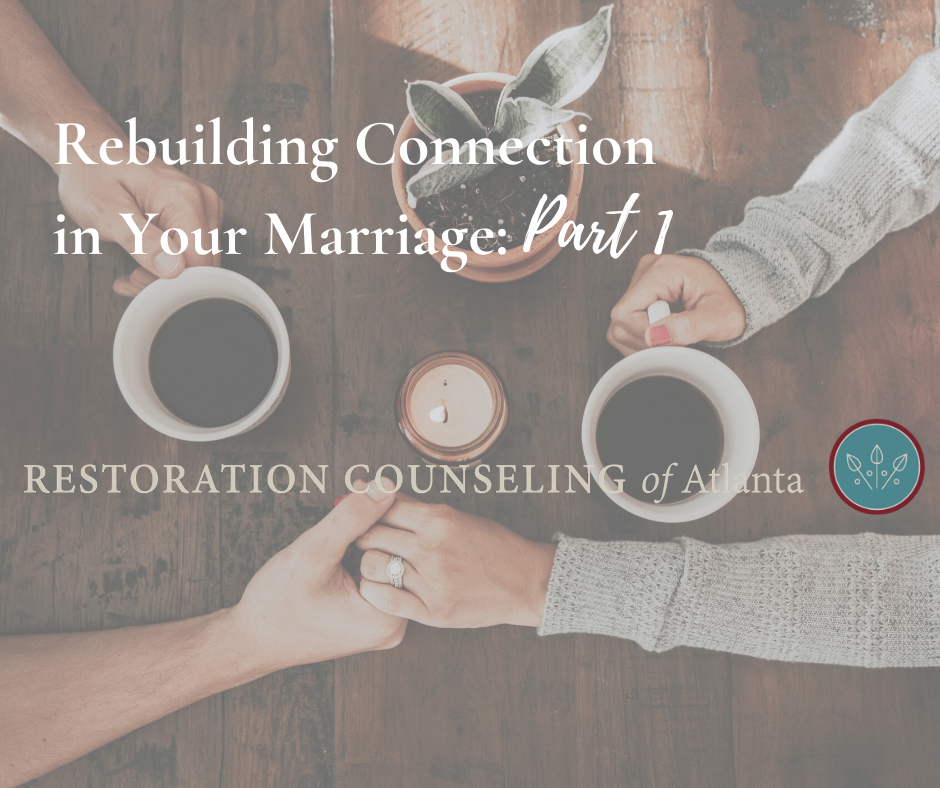As a Marriage and Family Therapist, I am often asked, “What do you think is the most important factor to have a healthy marriage?” While I’m tempted to say communication, I have worked with great communicators that were still stuck in the unhealthy cycles of their marriage. Instead, during the last five years of working with couples, I believe that empathy is the key to rebuilding connection, creating safety, and healing past hurts.
Here is a wonderful video where Brene Brown describes the unique power of empathy and how we can use it to connect:
Empathy
Empathy is very difficult. When someone is in pain, our most natural human reaction is to try and get them out of that pain. We jump to problem-solving; we try to change their perspective, anything to get them out of their pain. But as mentioned in the video above, those attempts are rooted in our own self-preservation. We don’t like the pain. We don’t want to feel like the world is unsafe, or that we did something wrong or were selfish; so more often than not, we jump to efforts that typically invalidate rather than encourage.
This is doubly true in a marriage. When the person who has hurt you is the very person you are trying to reconcile with, it requires an ego death. It requires a deep and sincere killing of one’s pride to love your spouse deeply enough to sit with them in their pain, even when you caused it. Yet, this is the very thing Christ invites us into, “For whoever wishes to save his life will lose it, but whoever loses his life for My sake, he is the one who will save it.1” Or when He uses the metaphor of His own death to explain how husbands are to love their wives, “as Christ loved the church and gave himself up for her.2”
When we are hurt by the one we love or when time and lack of intentionality have created space between you and your spouse, it can easily begin to feel lonely. As if we must hold our pain, our emotions, our conflict, by ourselves. Instead of the beauty of connection and partnership, we feel isolated and estranged.
Designed for Intimacy
It is in this place of disconnection and loneliness that we see God speak into existence for the first time in identifying that something is wrong, for “it is not good for man to be alone.3” He designed us for intimacy from the very beginning and when we feel most alone, empathy is the key to reconciliation.
For empathy creates a moment of connection and says, “I see you, I see your pain, and I’m willing to stay with you for as long as you need me.” In marriage, it can be in overt ways of reconciliation by saying, “I see how I was inconsiderate, I see how I hurt you, and I’m here with you to show you that I love you.” Or it can be in gentle support by saying, “I see how stressful things are, I’m with you in this season, what do you need from me?”
Vulnerability
The ability to have empathy goes hand in hand with the ability to be vulnerable. If empathy is difficult, vulnerability is perhaps even more so. It is the act of standing at the edge of the cliff, jumping off, and trusting that the other individual will catch you. It is to make bare one’s needs and run the risk of having those needs rejected or cast aside.
But the alternative is a scared and guarded life, one of disconnection and fear. Here we profoundly see the reality of John 10:10, “The enemy has come to kill, steal, and destroy, but I have come that you may have life and that life abundant.” God has created us for intimacy. He has created us to find safety and validation in the arms and hearts of those closest to us. To hide from the risk of rejection is to embrace a shadow of the life He died to give us.
There is great value in vulnerability, and I have seen the beauty of redemption manifested through risked vulnerability countless times in my work with couples. However, I want to recognize that it sometimes isn’t safe to be vulnerable with your spouse. If you perceive that to be true, I urge you to seek counseling together so that you might have a mediator in your journey towards healing. And while I certainly believe counseling is beneficial for couples that aren’t in crisis, it can do more harm than good to attempt to repair it on your own if the wounds are too great and too deep.
Helpful Tool
For many though, I want to give you the single most powerful tool I’ve seen or used in couples therapy. In their book How We Love, Milan and Kay Yerkovich created a step by step guide called the Comfort Circle. The Comfort Circle provides the listener with a series of questions to explore the speaker’s emotional world, to validate that world, and to humbly seek how to aid them in their distress.
While it may feel stilted or awkward, I strongly encourage you to use this tool word for word the first few times you use it. Each component of the tool targets a unique aspect of the emotion and does wonders for restoring a sense of safety, connection, and validation.
As I said in my last post, when you are doing an activity like this, it is important to make sure you and your spouse are alone: undistracted by phones, the television, or children and that you give each other your undivided attention. Then, use the Comfort Circle step by step, each of you going through the process one time. There is a section where they reference “soul words” and I will link that as well, but I actually prefer using a feelings wheel to help guide and understand the emotional expression.
Final Thoughts
I know that I am asking a great deal from you the reader. I’m asking you to risk vulnerability when you have been hurt in the past. But I ask it from you because I believe so deeply in the power of intimacy and reconciliation to restore the joy and passion for marriages. If you and your spouse will attempt this exercise and give each other the respect and attention your feelings deserve, I am confident you will begin to feel more connected, informed, and compassionate.
Comfort Circle: https://s3.amazonaws.com/hwl-prod-assets/uploads/2016/11/24052821/ComfortCircleForTheListener.pdf
Feelings Wheel: http://feelingswheel.com/
Soul Words: https://s3.amazonaws.com/hwl-prod-assets/uploads/2012/05/16030007/SoulWordList.pdf
1. Luke 9:24
2. Ephesians 5:25
3. Genesis 2:18

Written by: Kyle Sussenbach, LAMFT
Roswell location
kyle@restorationcounselingatl.com, ext. 117
Kyle is trained to work with individuals, couples, and families experiencing a wide range of issues including depression, anxiety, addictions, anger, suicidality, and relational distress. He also pursued further training related to sexual issues including shame, dysfunction, addiction, paraphilia, and trauma.
He is certified in PREPARE/ENRICH and is a Level 2 Gottman Method Couples Therapist. His primary focus is working with couples through relational and sexual difficulties. He is passionate about marriage and its purpose in sanctifying the couple and illustrating the relationship between Christ and the Church

